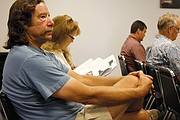PUD customers testify against rate increases
MOSES LAKE - Like many others, Moses Lake retiree Jeff Powell lives on a fixed income.
He struggles with any increases to his monthly power bill.
"I'm retired and I haven't had a cost-of-living increase for three years," he said. "I was treading water pretty good until three years ago. You keep sending rate increases back to me at the bottom. I'm at the bottom of the food chain here."
He understands it costs money to do business.
"But I'm at the bottom and you're not giving me any help here," Powell added.
Powell was one of about 20 people who attended Tuesday night's rate hearing in Moses Lake.
Next year, the proposed average increase for Grant County PUD residential customers is about $6 per month.
Each rate group has different revenue increases proposed, from 8 percent to 12 percent.
The proposed increase amounts are because of the increasing operating costs for the dam's federal license and work done replacing aging turbines and generators.
The cost of debt service for the capital projects is a major factor, which is similar to debt service home owners pay for mortgages, explained Tim Culbertson, Grant PUD's general manager.
Another factor is the negative prices in the market, which are driving energy values down, Culbertson said.
Grant PUD sells power from its Priest Rapids Project to other utilities.
"None of us likes to see rate increases, but they are a necessity," Culbertson commented, in part. "Our costs are going up and we have to cover those costs. As we work through the coming years, we're committed to collect sufficient revenue to cover those costs, by offering steady, predictable rate increases, and providing early notification to customers."
The cost of the Priest Rapids Project will double by 2015, he said.
Ag Water and Power Users President Dan Miller said group members use 15 percent of Priest Rapids Project power.
He asked commissioners to do whatever possible to reduce rate increases and look for savings with upcoming capital projects.
William McCormick, of Moses Lake, asked commissioners why the district bought Getty's Cove in 2009, which is near Wanapum State Park in Kittitas County.
The district purchased the 97 acres of property for $1.49 million.
The purchase was made in lieu of buying more expensive property and recommended by staff, explained Randy Allred, commission president.
Commissioner Tom Flint said he didn't want to leave the impression the land was bought out of pure speculation.
"We have huge requirements in this license," Flint said. Many of the requirements involve developing more recreation for the public, which is more expensive than buying developed property like Getty's Cove.
"We got it at a bargain," Flint said.
Gary Ash, of National Frozen Foods Corporation, said he has a big concern about food processors' rates.
He reiterated points about the PUD's high debt service, originally made during a consultant's report provided at Monday night's rate hearing in Ephrata.
The district's reserve fund could also be supplemented with a line of credit, Ash said.
According to his calculations, food processors will see a 15.5 percent rate increase, he said. The amount apparently includes a demand charge, he said.
He said there is no room for his company to grow with the proposed 7.5 megawatt cap.
He estimated that food processors use 50 megawatts annually, which is equal to power used by one data center.
Doug Burk of Ephrata commented about the insensitivity being shown by starting increases on Jan. 1.
Customers have bills from Christmas and are receiving tax bills and dealing with higher winter power rates.
He recommended increases start in April instead.
Pat Boss, of the Port of Quincy, said the eight-percent rate increases are "excessive and unreasonable, especially given the precarious nature of our state and national economy, as well as the need for this area to remain competitive in creating jobs and attracting new companies."
He asked the PUD to adopt smaller increases.
Large increases could "adversely impact economic development in Quincy and Grant County and lessen our ability to compete for new economic developments that will create jobs and benefit the tax base of Grant County," he said.
Ed Stubington, of Moses Lake, said the area's economy is not the same as everywhere else and asked what was driving the increase.
Given the local economy, an eight-percent increase is pretty aggressive, he said.
Commissioner Allred said the short answer was debt service.
Public testimony given this week helps PUD commissioners decide how to allocate rate increases for each customer group.
Commissioners are scheduled to vote on the allocations Sept. 6, to start increases Jan. 1.
Grant PUD commissioners approved rate increases in 2010, with rates going up by four percent in 2010 and six percent in 2011.
At $68 per month, Grant PUD ranks third out of 14 Northwest utilities offering the lowest residential rates, according to information provided by the district.
Douglas County PUD residential customers pay an average of $40 per month for power and Chelan County PUD customers have a $44 per month bill.
To see presentation materials and calculate your monthly electric bill with a proposed residential rate calculator, visit www.gcpud.org.
Public comment is also being accepted at 2 p.m., at the Sept. 6 commission meeting, at 30 C St. SW, Ephrata.
Written comments can be submitted by email to commissioners@gcpud.org or to district headquarters, at 30 C St. SW, Ephrata, 98823.





